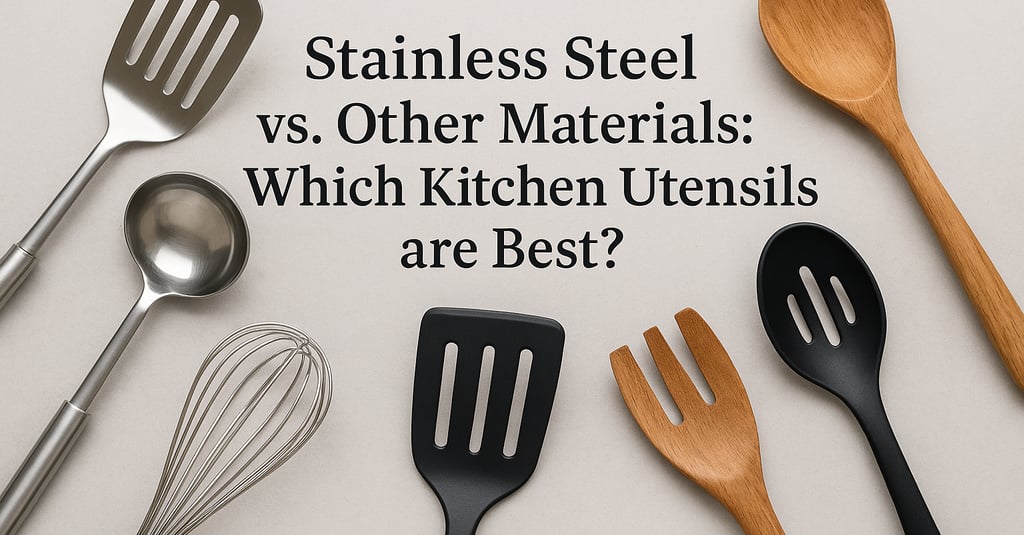Stainless Steel vs. Other Materials: Which Kitchen Utensils are Best?
7/29/20255 min read


Introduction to Kitchen Utensils
Kitchen utensils play a critical role in the culinary world, influencing not just the preparation of food, but also the overall cooking experience. The selection of appropriate kitchen utensils can significantly enhance cooking performance, making tasks such as chopping, stirring, and serving more efficient. Utensils, ranging from knives and spoons to spatulas and whisks, are tools that help in achieving desired textures and flavors while also allowing chefs and home cooks alike to express their creativity in the kitchen.
When it comes to choosing kitchen utensils, material selection is of utmost importance. The materials used can affect the durability of the utensils, their maintenance requirements, and even food safety. For example, stainless steel is renowned for its resistance to rust and corrosion, making it a popular choice among professionals and enthusiasts. In contrast, utensils made from wood or plastic may require different care and have varying levels of longevity. Also, some materials can react with certain food items, leading to potential safety concerns, while others may not stand up to the rigorous demands of heat and hard usage.
Furthermore, the design and construction of kitchen utensils influence their functionality. A well-crafted utensil not only improves the efficiency of cooking but also contributes to safety by providing a secure grip and preventing injuries. Choosing the right kitchen tools is also a matter of ergonomics, as well-designed utensils can help reduce fatigue during prolonged cooking sessions. Thus, understanding the implications of material choice is essential for anyone looking to optimize their culinary endeavors and ensure a successful cooking experience.
Properties of Stainless Steel Utensils
Stainless steel is a highly regarded material used in the construction of kitchen utensils, known for its distinct properties that enhance both functionality and appeal. One of its primary characteristics is durability. Stainless steel utensils are engineered to withstand the rigors of daily use, making them a long-lasting choice for culinary tasks. This resilience ensures that they do not easily crack, bend, or warp, which is often a concern with utensils made from softer materials.
Another significant aspect of stainless steel is its corrosion resistance. Unlike other metals, stainless steel contains chromium, which forms a protective layer that prevents rust and stains. This makes stainless steel utensils ideal for kitchen environments where moisture is prevalent. The ability to resist corrosion means that these utensils maintain their structural integrity and aesthetic appeal over time, making them a valuable addition to any kitchen.
Stainless steel is also known for its non-reactive nature. This property is particularly important for cooking and food preparation, as stainless steel does not react with acidic or alkaline foods. Unlike some other materials, it will not impart any metallic flavors or chemicals to the food, ensuring that meals are prepared safely and tastefully. This makes stainless steel a preferred choice for professional chefs and home cooks alike.
Moreover, stainless steel utensils are celebrated for their ease of cleaning. They can be conveniently washed in a dishwasher, and their smooth surface discourages the buildup of bacteria. When considering the grades of stainless steel, utensils are commonly made from 18/10, 18/8, and 18/0 stainless steel. The first number denotes the chromium content, while the second indicates the nickel content. Higher nickel grades, such as 18/10, provide increased resistance to corrosion and give a shiny finish, enhancing the overall performance and longevity of the utensil.
Comparing Other Materials: Plastic, Wood, and Silicone
When selecting kitchen utensils, it is essential to consider the materials available, as each offers distinct advantages and disadvantages. In addition to stainless steel, plastic, wood, and silicone are popular materials used in various kitchen tools. Understanding their properties can help consumers make informed choices based on specific cooking needs.
Plastic utensils are lightweight and often more affordable than those made of stainless steel. They are resistant to staining and easy to clean, making them appealing for everyday use. However, plastic is not heat resistant and may warp or melt at high temperatures, which limits its suitability for certain cooking tasks. Moreover, concerns have been raised about the potential leaching of harmful chemicals from plastic into food, particularly when heated. As such, consumers should look for BPA-free options and monitor their usage carefully to minimize health risks.
Wooden utensils have long been valued for their durability and natural aesthetics. They are heat resistant and do not conduct heat well, which makes them safe for use with hot cookware. Additionally, wood is gentle on surfaces, preventing scratches on non-stick pans and other delicate cookware materials. However, wooden utensils can be challenging to clean and may harbor bacteria if not properly maintained. They can absorb odors and flavors from food, potentially impacting taste over time. Regular oiling and proper storage are recommended to maintain their longevity.
Silicone utensils combine the benefits of flexibility, heat resistance, and non-stick properties. They can withstand high temperatures without melting, making them an excellent choice for cooking and baking. Silicone utensils are also easy to clean, as they are generally dishwasher safe and non-porous. However, they may not provide the same level of sturdiness as stainless steel or wooden utensils, especially for tasks that require significant strength, such as flipping or sautéing heavier foods.
In conclusion, while stainless steel offers excellent durability, versatility, and safety features, the choice between plastic, wood, and silicone kitchen utensils should be driven by individual cooking needs and preferences. Each material has its strengths and weaknesses, which should be considered carefully to enhance the cooking experience while ensuring food safety.
Choosing the Right Utensils for Your Kitchen
When it comes to selecting kitchen utensils, various factors should be considered to ensure that your choices align with your cooking style, budget, and personal preferences. The right utensils can significantly enhance your culinary experience, making meal preparation more efficient and enjoyable. One crucial aspect to consider is compatibility with your cookware. For instance, if you predominantly use non-stick pans, it is advisable to choose utensils made from materials like silicone or wood, which will prevent scratching and preserve the integrity of the cookware. On the other hand, stainless steel utensils are well-suited for high-heat cooking and can be safely used with a wide range of cookware.
Your budget is another important consideration. While stainless steel utensils may be slightly more expensive, they offer durability and longevity, justifying the initial investment. In contrast, plastic utensils might be more affordable but often have a shorter lifespan. Therefore, it is prudent to assess how often you cook and the types of meals you typically prepare to make informed decisions about the utensils to invest in.
Personal preferences, including aesthetics, also play a vital role in your selection process. A cohesive kitchen style can positively influence your cooking experience; therefore, consider utensils that complement your kitchen’s decor. There are a variety of colors and designs available, allowing you to express your style while ensuring practicality. Additionally, maintenance requirements should not be overlooked; choose utensils that are easy to clean and maintain, as this will enhance your cooking routine.
In conclusion, by carefully considering cookware compatibility, budget constraints, personal style, and maintenance needs, you can develop a well-rounded collection of kitchen utensils that will serve you well in your culinary endeavors.
Fonir Global Pvt. Ltd.
QUICK LINKS
© 2025. All rights reserved.


OUR PRODUCTS
